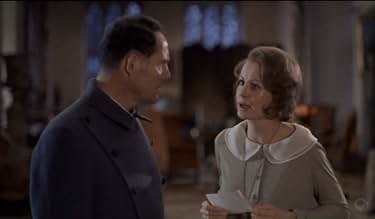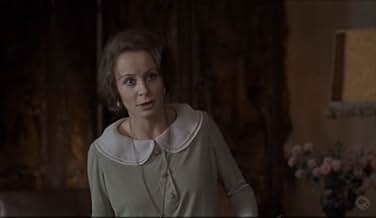NOTE IMDb
6,6/10
914
MA NOTE
Une jeune femme britannique souffrant de dépression suite à la perte de son mari développe une relation inhabituelle avec son chauffeur.Une jeune femme britannique souffrant de dépression suite à la perte de son mari développe une relation inhabituelle avec son chauffeur.Une jeune femme britannique souffrant de dépression suite à la perte de son mari développe une relation inhabituelle avec son chauffeur.
- Réalisation
- Scénario
- Casting principal
- Victoire aux 3 BAFTA Awards
- 6 victoires au total
Anna Barry
- Dinner Party Guest
- (non crédité)
Richard Burrell
- Dinner Party Guest
- (non crédité)
George Hilsdon
- Perkins
- (non crédité)
Eric Kent
- Man Going Into Building
- (non crédité)
Don McKillop
- Boxing Match MC
- (non crédité)
Commentaire à la une
The 1973 Palme d'Or winner (a tie with SCARECROW, 1973), a British film directed by Alan Bridges and adapted from L.P. Hartley's novel, screen-scripted by Wolf Mankowitz, is quite a curio to find, stars Sarah Miles and Robert Shaw as an odd pair, the story takes place at rural England after WWI, it is an acrimonious tirade towards British hierarchical underbelly and is spiced up by the qualified performances from two leads, Miles' innate fragility and gullible naivety finds a quite befitting rhythm with Shaw's rough edge and macho dominance (also Peter Egan's nob Captain is graphically delineated with a light touch), despite the fact that the film is somewhat a lukewarm achievement.
Miles is Lady Franklin, an upper-class new widow suffers from the post-trauma of her bereavement, anew from convalescence, she is mentally hurdled to resume her social life and raring to find someone who she could talk to, when she meets her new chauffeur Ledbetter (Shaw), who just initiates his own private rent business, Lady Franklin is clearly not that kind of clever woman of his tier, she befriends with him and it's not another DRIVING MISS DAISY (1989, 8/10) well-intentioned (racial) class-defying friendship crowd-pleaser, things will turn ugly as Ledbetter's escalating jealousy and infatuation towards Lady Franklin grows, which will end up with a clumsy self-destructive finale driven by indignant impulse (he doesn't have the luck and handsomeness which befits the romantic credentials in DOWNTOWN ABBEY).
It is again a glum, inclement England, the lamenting dirge belts out along the first half of the film, Lady Franklin, bears a frail delicacy and her indecisive nerve of "getting the knack" to continue her life in the countryside getaway, bespeaks a damsel-in-mistress desperate for a savior (her ill-tempered, apathetic and self-centered mother, Elizabeth Sellars brings the role point-blank accuracy, for sure is more of a nuisance than a comfort here), so Ledbetter, who is professional and pretty sentient of their social disparity at first, would slowly capitulate to Lady Franklin's daring openness and closeness, and mistakes it as a kind of mutual affection (reaches to the pinnacle when he receives a helluva bunch of money from her to save his bogus financial mire), for Lady Franklin, she is much obliging to give the dole as it is a sort of compensation towards Ledbetter's optimum services and a relief to her own conscience (an upper class privilege) as well, money is her final offer, not love, of which we onlookers are all fully aware but not Ledbetter, in his eyes, it is a signal of devotion, an illusion while kindness mis-conceited as the flame of desire, especially when the benefactor is from a higher-up echelon, naturally the delusion has to be unsparingly shattered, it is the perpetual tragedy resides within the classes between "sanctimonious" upstairs and "covetous" downstairs. Like Shelton Cooper from THE BIG BANG THEORY rightfully teases "the upstairs should never eat with downstairs, it will only give them a false hope of the life they would never be involved", which I'm paraphrasing here.
With all respect to the team effort, THE HIRELING doesn't ring true as a prestigious Palme d'Or champion, it is nothing but a solid period feature carries a powder peg to indict the tenacious scourge, and eventually misfired.
Miles is Lady Franklin, an upper-class new widow suffers from the post-trauma of her bereavement, anew from convalescence, she is mentally hurdled to resume her social life and raring to find someone who she could talk to, when she meets her new chauffeur Ledbetter (Shaw), who just initiates his own private rent business, Lady Franklin is clearly not that kind of clever woman of his tier, she befriends with him and it's not another DRIVING MISS DAISY (1989, 8/10) well-intentioned (racial) class-defying friendship crowd-pleaser, things will turn ugly as Ledbetter's escalating jealousy and infatuation towards Lady Franklin grows, which will end up with a clumsy self-destructive finale driven by indignant impulse (he doesn't have the luck and handsomeness which befits the romantic credentials in DOWNTOWN ABBEY).
It is again a glum, inclement England, the lamenting dirge belts out along the first half of the film, Lady Franklin, bears a frail delicacy and her indecisive nerve of "getting the knack" to continue her life in the countryside getaway, bespeaks a damsel-in-mistress desperate for a savior (her ill-tempered, apathetic and self-centered mother, Elizabeth Sellars brings the role point-blank accuracy, for sure is more of a nuisance than a comfort here), so Ledbetter, who is professional and pretty sentient of their social disparity at first, would slowly capitulate to Lady Franklin's daring openness and closeness, and mistakes it as a kind of mutual affection (reaches to the pinnacle when he receives a helluva bunch of money from her to save his bogus financial mire), for Lady Franklin, she is much obliging to give the dole as it is a sort of compensation towards Ledbetter's optimum services and a relief to her own conscience (an upper class privilege) as well, money is her final offer, not love, of which we onlookers are all fully aware but not Ledbetter, in his eyes, it is a signal of devotion, an illusion while kindness mis-conceited as the flame of desire, especially when the benefactor is from a higher-up echelon, naturally the delusion has to be unsparingly shattered, it is the perpetual tragedy resides within the classes between "sanctimonious" upstairs and "covetous" downstairs. Like Shelton Cooper from THE BIG BANG THEORY rightfully teases "the upstairs should never eat with downstairs, it will only give them a false hope of the life they would never be involved", which I'm paraphrasing here.
With all respect to the team effort, THE HIRELING doesn't ring true as a prestigious Palme d'Or champion, it is nothing but a solid period feature carries a powder peg to indict the tenacious scourge, and eventually misfired.
- lasttimeisaw
- 6 mai 2013
- Permalien
Histoire
Le saviez-vous
- AnecdotesThe film was entered and selected to screen in competition at the Cannes Film Festival in 1973 where the picture won in a tie the prestigious Palme d'Or (The Golden Palm) award shared with Jerry Schatzberg's L'épouvantail (1973).
- Citations
Lady Franklin: [Asking Hugh about his wartime experiences] Was it very bad?
Captain Hugh Cantrip: [There is a telling silence: we cannot see his expression because of the shadows]
Lady Franklin: Well, you're back now.
Captain Hugh Cantrip: [as light and shadow flicker across his face] Am I? Sometimes I wonder...
- ConnexionsFeatured in Sven Uslings Bio: The Hireling (2020)
Meilleurs choix
Connectez-vous pour évaluer et suivre la liste de favoris afin de recevoir des recommandations personnalisées
- How long is The Hireling?Alimenté par Alexa
Détails
- Date de sortie
- Pays d’origine
- Langue
- Aussi connu sous le nom de
- The Hireling
- Lieux de tournage
- Sociétés de production
- Voir plus de crédits d'entreprise sur IMDbPro
- Durée1 heure 48 minutes
- Mixage
- Rapport de forme
- 1.85 : 1
Contribuer à cette page
Suggérer une modification ou ajouter du contenu manquant

Lacune principale
By what name was La méprise (1973) officially released in Canada in English?
Répondre














